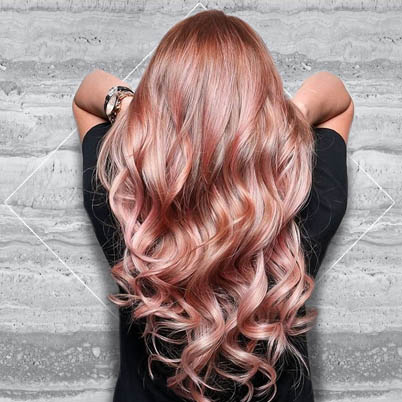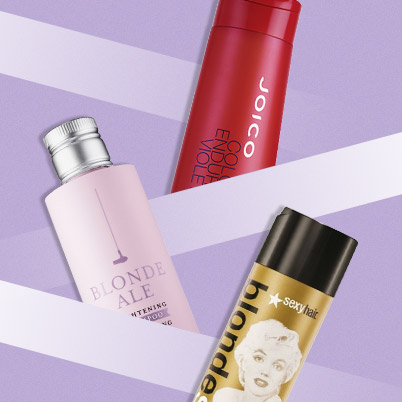Before we get to these insanely important questions about lathering, rinsing and repeating, let's start by debunking some oft-repeated beauty advice: Frequent shampooing makes your scalp produce more oil; or, alternatively, that you can train your scalp to produce less oil by washing infrequently.
"This is a myth," says top dermatologist Dr. Elizabeth Tanzi, founder and director of Capital Laser & Skin Care and assistant clinical professor of dermatology at the George Washington University Medical Center. "Hair produces oil regardless of washing."
Dr. Francesca Fusco, dermatologist at Wexler Dermatology, agrees: "Oil production is under hormonal control." So, while your scalp's oil production varies over time, it's not dependent on how much you wash your hair. Anabel Kingsley, trichologist at Philip Kingsley, agrees: "The scalp usually becomes oilier during puberty, in times of intense stress and also during ovulation." Perhaps due to the enduring myth, shampoo's reputation has suffered. But experts agree there's nothing wrong with the suds-and-water routine. Not only are shampoos chemically formulated for regular use, water plays a vital role in healthy hair, constituting about 15 percent of its weight. "It is actually water, not oil, content that keeps strands elastic and pliable," says Kingsley.
Image via Getty
"This is a myth," says top dermatologist Dr. Elizabeth Tanzi, founder and director of Capital Laser & Skin Care and assistant clinical professor of dermatology at the George Washington University Medical Center. "Hair produces oil regardless of washing."
Dr. Francesca Fusco, dermatologist at Wexler Dermatology, agrees: "Oil production is under hormonal control." So, while your scalp's oil production varies over time, it's not dependent on how much you wash your hair. Anabel Kingsley, trichologist at Philip Kingsley, agrees: "The scalp usually becomes oilier during puberty, in times of intense stress and also during ovulation." Perhaps due to the enduring myth, shampoo's reputation has suffered. But experts agree there's nothing wrong with the suds-and-water routine. Not only are shampoos chemically formulated for regular use, water plays a vital role in healthy hair, constituting about 15 percent of its weight. "It is actually water, not oil, content that keeps strands elastic and pliable," says Kingsley.
Image via Getty
"Hair texture is a big factor in how often someone [should] shampoo," says Michelle Blaisure, director of education Bosley Professional Strength and certified trichologist. "Fine hair gets limp and loses volume within a day or two, whereas someone with thick or curly, textured hair generally can go much longer between washes."
Kingsley explains why fine hair needs more frequent shampooing than thick or textured hair. "Individuals with fine hair have more hairs per square centimeter," she says. "[Because] each hair has a sebaceous gland attached to it, the scalp produces more oils. Those experiencing reduced volume are also more prone to getting greasy hair and limp roots, due to the fact that there is a reduced surface area for the oils to cover."
Kingsley suggests fine-haired women wash daily with "a lightweight, protein-rich shampoo" like Philip Kingsley Body Building Shampoo, $32. We also like Garnier Fructis Daily Care Shampoo, $3.99.
Image via Getty
Kingsley explains why fine hair needs more frequent shampooing than thick or textured hair. "Individuals with fine hair have more hairs per square centimeter," she says. "[Because] each hair has a sebaceous gland attached to it, the scalp produces more oils. Those experiencing reduced volume are also more prone to getting greasy hair and limp roots, due to the fact that there is a reduced surface area for the oils to cover."
Kingsley suggests fine-haired women wash daily with "a lightweight, protein-rich shampoo" like Philip Kingsley Body Building Shampoo, $32. We also like Garnier Fructis Daily Care Shampoo, $3.99.
Image via Getty
If you live in a hot or humid climate, or live to exercise, our experts give you permission to shampoo daily. "Hot, humid climates will make people sweat and produce more oil, so the scalp may need more frequent cleansing," says Tanzi. Same for those who work out, she advises.
"Hair should also always be shampooed after exercising," Kingsley says. "As we sweat, more oil and bacteria can build up on the scalp."
Letting oil and sweat linger between shampoos can cause side effects like irritation, bacteria growth and foul odors -- and worse, according to Blaisure. "I have seen many people with hair loss who do not shampoo often," she says. "Oil and bacteria buildup can cause scalp problems, which can lead to inflammation in the skin, which then becomes a factor for those who experience hair loss."
People who live in cold climates (or amid constant A/C) and don't sweat on the regular can shampoo less frequently. "These individuals tend to shampoo less, but that is not always necessary," Fusco says. "A shampoo which is hydrating and nourishing" is fine for every day. Try: Briogeo Blossom & Bloom Ginseng + Biotin Volumizing Shampoo, $24.
Image via Getty
"Hair should also always be shampooed after exercising," Kingsley says. "As we sweat, more oil and bacteria can build up on the scalp."
Letting oil and sweat linger between shampoos can cause side effects like irritation, bacteria growth and foul odors -- and worse, according to Blaisure. "I have seen many people with hair loss who do not shampoo often," she says. "Oil and bacteria buildup can cause scalp problems, which can lead to inflammation in the skin, which then becomes a factor for those who experience hair loss."
People who live in cold climates (or amid constant A/C) and don't sweat on the regular can shampoo less frequently. "These individuals tend to shampoo less, but that is not always necessary," Fusco says. "A shampoo which is hydrating and nourishing" is fine for every day. Try: Briogeo Blossom & Bloom Ginseng + Biotin Volumizing Shampoo, $24.
Image via Getty
Our experts agree that it's fine to wash hair daily if you're using shampoos with gentle ingredients. "For frequent shampooers, try to avoid sulfates," says Tanzi. Sulfates are added to shampoos to reduce sebum and build lather, but they are also known to cause dryness and irritation.
"Sulfate-free shampoos are usually the gentlest, especially for color treated hair," agrees Cristina B, stylist at Rita Hazan Salon. "Rita Hazan True Color Shampoo, $26, is great."
Fusco recommends buying products with botanically based moisturizing ingredients. "Soybean oil, coconut and shea butter are some of the most nourishing ingredients out there," she says.
Surprisingly, Blaisure is "not a fan" of cleansing conditioners, which are typically marketed as gentle cleansers. "Many of these products are not really cleaning the skin, but instead are leaving a lot of bacteria residue on the scalp, which can lead to build-up of products and oil and leave the scalp vulnerable to inflammation," she says. Blaisure suggests a sulfate-free, pH-balanced shampoo like Bosley Professional Strength BosDefense Nourishing Shampoo, $15.99.
Image via Getty
"Sulfate-free shampoos are usually the gentlest, especially for color treated hair," agrees Cristina B, stylist at Rita Hazan Salon. "Rita Hazan True Color Shampoo, $26, is great."
Fusco recommends buying products with botanically based moisturizing ingredients. "Soybean oil, coconut and shea butter are some of the most nourishing ingredients out there," she says.
Surprisingly, Blaisure is "not a fan" of cleansing conditioners, which are typically marketed as gentle cleansers. "Many of these products are not really cleaning the skin, but instead are leaving a lot of bacteria residue on the scalp, which can lead to build-up of products and oil and leave the scalp vulnerable to inflammation," she says. Blaisure suggests a sulfate-free, pH-balanced shampoo like Bosley Professional Strength BosDefense Nourishing Shampoo, $15.99.
Image via Getty
Love hair products? Then you also better love shampooing. "Individuals who use a lot of product -- hair spray, gels, et cetera -- may require more frequent shampooing," Fusco confirms. Product build-up can make hair look dull and can irritate the scalp with prolonged exposure, just like oil does.
And if you haven't given much thought to scalp condition, you should, according to Blaisure. "Researchers and scientists who study hair and scalp are realizing the importance of a balanced scalp and how it relates to hair and scalp health," says Blaisure. A healthy scalp produces soft, manageable hair that grows quickly; an unhealthy scalp can lead to unruly hair texture, sluggish hair growth and the aforementioned hair loss.
(For more proof that an out-of-whack scalp could be causing lackluster locks, read The Real Reason You're Having a Bad Hair Day.)
Image via Getty
And if you haven't given much thought to scalp condition, you should, according to Blaisure. "Researchers and scientists who study hair and scalp are realizing the importance of a balanced scalp and how it relates to hair and scalp health," says Blaisure. A healthy scalp produces soft, manageable hair that grows quickly; an unhealthy scalp can lead to unruly hair texture, sluggish hair growth and the aforementioned hair loss.
(For more proof that an out-of-whack scalp could be causing lackluster locks, read The Real Reason You're Having a Bad Hair Day.)
Image via Getty





